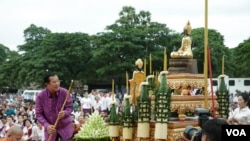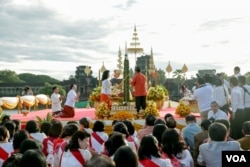Prime Minister Hun Sen was joined by thousands of monks and fellow ruling Cambodian People’s Party officials for a ceremony at the Angkor temples on Sunday to pray for political stability and “happiness” after his party dissolved the country’s main opposition, cementing his grip on power.
His continued rule -- he has been in power since 1985 -- was virtually assured after the country’s top court last month disbanded the Cambodia National Rescue Party ahead of next year’s elections. He has vowed to remain in power for another decade.
The government hoped the ceremony would project an image of tranquility, quite opposed to the image of political repression its critics have described in recent months. As well as dissolving Hun Sen’s only real opposition, his party has charged the leader of the CNRP, Kem Sokha, with treason for allegedly plotting his overthrow.
Sokha and the CNRP deny the claims, which have been described as baseless by the U.S. government, which Hun Sen’s CPP claimed had tried to incite an anti-government uprising in Cambodia.
Culture Minister Phoeung Sakona told reporters on Sunday that the ceremony meant that Cambodians should be thankful for enjoying “long-lasting happiness” under Hun Sen.
“If we weren’t happy, we couldn’t celebrate like this. If we had war, like other countries in the Middle East, we would be on the run and could not celebrate,” he said, adding that the “cultural” event had nothing to do with recent political events in the country.
At the ceremony, Hun Sen was flanked by senior ministers decked out in traditional Khmer dresswear, including Interior Minister Sar Kheng and Defense Minister Tea Banh.
Astrid Norén-Nilsson, author of “Cambodia’s Second Kingdom”, however, said the ceremony was intended “to gloss over existing political division by refocusing attention on ‘national unity’, epitomized by Angkor Wat, presenting Hun Sen and his government as guarantors of that unity.”
Thousands of ordinary Cambodians also attended the event. Long Thoun, 52, traveled from Kampong Thom to attend the event with her husband. “I have heard there are many controversial issues in our country, but it’s better just to wish. I’m not knowledgeable enough to talk about it [politics], I just want to see Cambodians live on their land happily,” she said.
Chhouen Kong, 18, will be eligible to vote in next year’s election for the first time. He told VOA that he could not understand why the CPP and CNRP could not work together for the benefit of the nation.
“I will look at their ability to improve industry to ensure that people can escape poverty and become more developed,” he said of his voting intentions.
Few attendees felt at liberty to openly discuss the political crisis that has engulfed Cambodia.
Jonathan Sutton, a Southeast Asia researcher at the University of Otago, said while the government had tried to “make the crackdown look legal, it was so blatant that they haven’t been able to maintain the thin veneer of democracy in the same way they had in the past.”
“After the CNRP’s dissolution, neither ‘democracy’, nor ‘peace’, means the same thing as before,” said Norén-Nilsson.
“There has been an earthquake, a defining break between the past and the present, but the government maintains the same language. Cambodians are made to understand that ‘peace’ now equals acceptance of the dissolution of the political opposition.”










